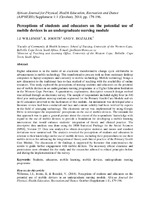Perceptions of students and educators on the potential use of mobile devices in an undergraduate nursing module
Abstract
Higher education is in the midst of an electronic transformative change cycle attributable to advancements in mobile technology. This transformative process took us from stationary desktop computers to laptop computers and currently to mobile technology. Mobile technology brings a new dimension to the traditional face-to-face method of teaching with the availability of online resources. This study explored the perceptions of nursing students and educators on the potential use of mobile devices in an undergraduate nursing programme at a Higher Education Institution in the Western Cape Province. A quantitative, explanatory, descriptive research design method was utilised through an electronic survey. The sample of respondents included eighty four (n=84) third year undergraduate nursing students registered for the Primary Health Care Module and six (n=6) educators involved in the facilitation of this module. An instrument was developed after a literature review had been conducted and face and content validity had been verified by experts in the field of emerging technology. The electronic survey was implemented by using Google Drive to investigate the respondents’ perceptions on the use of mobile devices. The rationale for that approach was to gain a general picture about the extent of the respondents’ knowledge with regard to the use of mobile devices to provide a foundation for developing a mobile learning intervention that would enhance students’ integration of theory and clinical practice. The descriptive data analysis was done using the IBM Statistical Package for the Social Sciences (SPSS), Version 22. Data was analysed to obtain descriptive statistics and means and standard deviations were summarised. The analysis revealed the perceptions of students and educators in relation to their knowledge on the use of mobile devices, including their preparedness to use their mobile devices for enhancing the integration of theory and clinical practice of the Primary Health Care Module. The discussion of the findings is supported by literature that contextualises the results to guide further engagement with mobile devices. The necessary ethical clearance and permissions were obtained for the study and the researcher adhered to ethical principles before and during the implementation of the survey.

